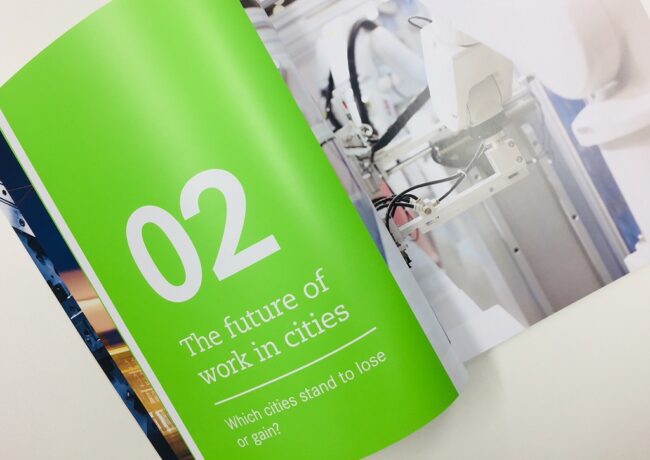Centre for Cities: One in four Northern jobs at risk from automation
A report from the thinktank into the impact of increased automation highlighted a greater risk for cities in the Midlands and the North, which could face one in four jobs being lost by 2030, compared to one in eight jobs in the South.
The Cities Outlook report is Centre for Cities’ annual analysis of the 63 largest conurbations in the UK. For 2018, the report looked the changes which could be expected through the greater use of robots, and highlighted and in North/South divide.
Speaking at the launch of the report yesterday, Andrew Carter, chief executive, said: “For some of our cities, particularly in the North or Midlands, the expectation is this could result in one in four jobs being lost to automation by 2030. This changes to one in seven, or one in eight for cities in the South.”
The view for the North West was mixed. While Blackburn rated as one of the UK locations most likely to lose jobs, Blackpool ranked as one of the top 10 least likely to suffer from automation.
While job creation is expected, Carter warned it wouldn’t necessarily be white collar workers who would see the benefit of new tech jobs: “Overall we will be better off in aggregate as there will be job growth – but we need to examine the quality of that growth. In the South, they may be higher skilled and higher paid, and while the North and Midlands may see jobs growth, it could be at the lower-paid end, which in part already reflects the current economic performance.
“For instance, there are marked differences between Bristol and Blackburn. The danger is we’ll reinforce those differences. There are winners and losers in every change… but places and people need to be given adequate security to make sure they’re not left on the sidelines, as in the various industrial changes in the 70s. We can’t afford to do that again.”
Carter chaired a panel made up of Gemma Tetlow, economic correspondent at the FT, Naomi Climer from the Future of Work Commission, and Marvin Rees, Mayor of Bristol. While Climer said she viewed automation as “raw opportunity”, Tetlow said she felt constant Government tweaks on policy had led to scepticism over how much change could be implemented by the latest Industrial Strategy.
A concern for all was how much Government ‘band width’ was being taken up by Brexit, which was viewed as distracting all departments away from dealing with issues in domestic policy.
Rees predicted that Brexit would result in even fewer powers being devolved to outside the capital. “The ultimate irony of Brexit is that, while it was a symbol to the system, it might actually cause Westminster to try to hold on to more national control,” he said.
Rees was a firm advocate of more powers to the regions, stating: “National Government as a concept is busted.”
- View the full report here http://www.centreforcities.org/reader/cities-outlook-2018/





Hysterical nonsense.
By A Robot
Don’t worry about it, when Artificial Super Intelligence arrives you will all be working for Terran Federation, nothing can save you…except for maybe Roj Blake.
By Orac
Marvin Rees talking garbage I see.
By Millenial